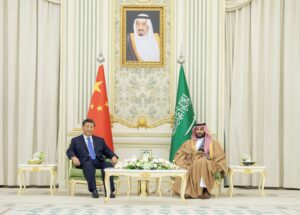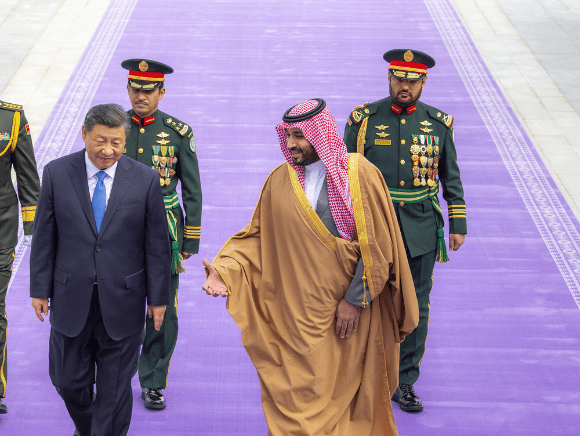Since former President Trump’s historic brokering of the Abraham Accords toward the end of his presidency, the Biden administration has allowed US influence in the Middle East to wither. The result is that China has gained a foothold as the consiglieri of peace between Saudi Arabia and Iran. This is no mean feat. Remember, Iran is the sponsor of Houthi rebels, providing weapons used to attack Saudi Arabia. On March 10, the Chinese Communist Party’s senior diplomat and former foreign minister, Wang Yi, stood grinning, hand-in-hand with Saudi National Security Adviser Musaad Bin Mohammed al-Aiban and Ali Shamkhani, Secretary of the Islamic Republic’s Supreme National Security Council.
China Brings Saudi Arabia and Iran Together
The agreement was reached as the United States stood on the sidelines watching two archenemies, China and Iran, make nice with what was believed to be a US friend and partner in the Middle East, Saudi Arabia. For its part, Saudi Arabia, lacking confidence in the US’s support, may have opted for another avenue for security in the region. A Voice of America report on the agreement explained:
“Iran and Saudi Arabia on Friday agreed to reestablish diplomatic relations and reopen embassies after years of tensions between the two countries, including a devastating attack on the heart of the Kingdom’s oil production attributed to Tehran. The deal, struck in Beijing this week amid its ceremonial National People’s Congress, represents a major diplomatic victory for the Chinese as Gulf Arab states perceive the United States slowly withdrawing from the wider Middle East.”
The announcement was made through a tweet by the Saudi Arabia foreign ministry, sounding like a commercial for China’s President Xi Jinping and the benevolence of the Chinese Communist Party (CCP). The Twitter message begins, “In response to the noble initiative of His Excellency President Xi Jinping, President of the People’s Republic of China (PRC), of China’s support for the developing good neighborly relations between the Kingdom of Saudi Arabia and the Islamic Republic of Iran…” The wording was designed to promote the CCP presence in the Arabian Gulf region and send a message to Saudi Arabia’s and Iran’s neighbors — with a broader reach back to the Indo-Pacific. The PRC’s intentions are not lost on the media in the Middle East either.
“I think this is a broader sign of the changing global order,” Sina Toossi, non-resident senior fellow at a Washington, DC, think tank, Center for International Policy, told Al Jazeera, “and how the period of America being the unchallenged global superpower – especially after the Cold War – that period is ending.” This follows several diplomatic gaffes by the Biden foreign policy team – most notable was Biden’s failed attempt to convince Saudi Crown Prince Mohammed bin Salman (MBS) not to cut oil production. The point was to show that the Biden administration had the cachet to persuade the Kingdom to work against its interest because the US asked. Unfortunately, Biden’s pleas met deaf ears.

Royal Court of Saudi Arabia/Handout (via Getty Images)
Biden’s Affronts to Saudi Arabia Not Helpful
Then, to add insult to the situation, Biden threatened MBS with consequences for the rebuff. The hubris was no more evident than Senator Richard Blumenthal’s comments, reported in Liberty Nation. “The senator explained that the Saudis owed it to the people of the US to revisit the OPEC+ decision to reduce oil exports,” LN explained. Additionally, Blumenthal suggested the US would punish the Kingdom by holding up weapons sales to the Saudis. Well, there just may be a new weapons dealer in the region – with a “Made in China” logo.
How does Biden’s National Security Council feel about this Gulf Region turn of events? There seems to be a “whistling past the graveyard” reaction. “We support any efforts to de-escalate tensions there and in the region,” John Kirby, White House national security spokesman, told the press. But what else could the Biden administration say? Kirby also said the Saudis kept Washington informed, though the Biden foreign policy and diplomatic teams were not involved. Robert Daly of the Wilson Center’s Kissinger Institute on China had a warning, telling Voice of America, “If America continues to be absent or underrepresented in world capitals and global fora, it will have only itself to blame. The Iran-Saudi deal did not result from some sneaky Chinese plot: China worked publicly and steadily for several years to achieve this end.”
Saudi Arabia broke diplomatic relations with Iran in 2016 when rioters stormed the Saudi embassy in Tehran when Riyadh executed the terrorist cleric Sheikh Nimr al-Nimr. A continuous conflict over the years between the two countries was the result. It’s not clear if this new peace agreement will end hostilities. What the CCP-negotiated accord will do is elevate Beijing in the eyes of non-aligned states as a peace broker. Furthermore, China’s success in the Middle East at the expense of the Biden White House gives credence to its recent propaganda diminishing the US’s role as a global leader. Beijing is on the move. Can the US stop it?
The views expressed are those of the author and not of any other affiliation.




